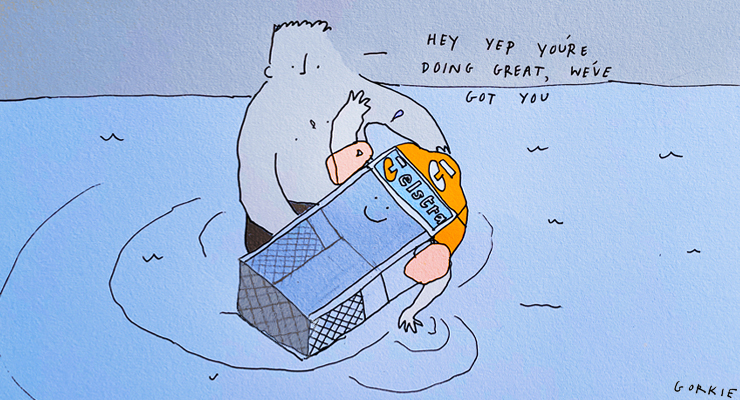
On October 25 Australia’s largest telecommunication company, Telstra, informed the Australian Stock Exchange and investors that it would acquire Digicel Pacific in “partnership” with the Australian government.
It is one of the most lucrative deals a company like Telstra could ever hope for.
The purchase price is US$1.6 billion. Telstra will contribute $270 million, the government the remaining $1.3 billion. Telstra will own 100% of the newly acquired company. It is guaranteed dividends of US$45 million a year for the next six years. The Australian Financial Review reports the government will insure Telstra against political risk on regulatory and tax issues and provide foreign exchange hedging.
So the risk for Telstra is trivially low, and the returns large. Digicel Pacific has earnings of about $300 million (US$230 million) a year. It is likely to deliver a significant boost to Telstra’s bottom line. Not surprisingly, Telstra shares rose on the news. The government might receive some payback from its investment if earnings exceed expectations but investors were told the government’s interests were “deeply subordinated” to those of Telstra.
Although virtually risk-free in a commercial sense for Telstra, the deal is not without risks to the government. Should Telstra make a mess of things in the Pacific — deliver unreliable services, poor quality or high prices — there is a down side not only for Telstra but also for Australia’s international reputation. The government is taking a gamble that Telstra won’t make those errors.
So why is it being so generous? Tellingly, its announcement of the deal came from Foreign Affairs Minister Marise Payne. Her statement contained fine sentiments about “development of secure and reliable infrastructure” in the Pacific and “forging trusted relationships with Pacific governments”. Nowhere was there a mention of the People’s Republic of China. Nevertheless, commentators had no doubt that the intention behind the government support was to prevent Chinese company China Mobile from buying Digicel Pacific. The headline in the Fin was “Telstra joins Team Australia on China”.
By way of background, Digicel Pacific’s parent company, Digicel, is in trouble. Based in the Caribbean, it has filed for bankruptcy before the Bermuda courts. It had been considering selling its Pacific arm since late last year. Word got around that China Mobile was interested — and Australian and US intelligence and security organisations knew it. Preventing that became a strategic priority.
While Digicel Pacific is not large or technologically advanced by world telco standards, it has considerable reach in the Pacific with a strong presence in, among others, Papua New Guinea (where it has its headquarters), Vanuatu, Nauru, Fiji, Samoa and Tonga.
As the Pacific region emerges from the tourism slump imposed by the COVID pandemic, their economies will recover; a successful telecommunications operator in these countries will be a source of both economic returns and soft power influence. In the current climate of tension and fearfulness, our government wanted to prevent China extending its reach through that means.
Telstra would not have taken on the risk of buying Digicel Pacific without the Australian government’s financial support. It was badly burned by unsuccessful overseas acquisitions in the late 1990s, while still majority government owned, documented by the AFR’s Steve Lewis. It acquired thousands of customers but not the earnings to go with them. Shareholders took a beating and it has been far more cautious since.
Australian government (i.e. taxpayer) dollars, and indemnification against risk, are not the end of the story.
In any heavily regulated industry (of which telecommunications is one) being on the “good side” of government is an important competitive advantage. Working hand in glove with the government to oppose China will become a barrier to its aspirations if at any time Telstra wants to venture into the latter country — but for now it is in the company’s interests. The government will look upon it more favourably, giving it an edge in any regulatory negotiations. Shareholders will be aware of that too, even if it is not the sort of thing spoken about in polite society.
Ironically, in seeking to thwart China our government has set up an arrangement that bears a strong resemblance to the relationship between the Chinese government and Chinese companies.
Most of our companies are privately owned, but the government has shown its preparedness to fund them to work in strategic and foreign policy interests. Many of China’s are state-owned, but their government expects them to make profits like a large Australian company — and to work in strategic and foreign policy interests.
In both countries it is now the case that working to further the strategy and priorities of the national government makes a company more successful. That’s been evident in China since the foundation of the republic in 1949. It is emerging practice in Australia.
In the end the main impact of this deal is increased cost and risk borne by Australian taxpayers. This deal will have been for nothing if a Chinese company acquires or builds another Pacific telco that out-competes Digicel Pacific and generates greater customer loyalty.
Having raised the stakes to this level the government will find it hard to back out — so if Digicel Pacific turns out to be more than Telstra can handle it is likely that Australian taxpayers will face even higher costs to bail them out.








The Liberal Party of Australia: the party that keeps on giving and giving and giving … to its mates.
Given all that is going on with them at the moment – the rorts, the corruption, the mendacity, the hypocrisy, the absence of accountability or integrity – they are passing beyond incompetence or criminality into the realm of pure evil.
What, in the name of all that is sacred, will it take to get the Australian public to throw these bastards out? And yet, I have a sinking feeling in the pit of my stomach that they will make it back in at the next election.
Same with Dan.
I have been wondering when this issue would rise. Chinese corporations that are successful yet have ties to the government are seen by 9, News, ABC etc as bad and must be contained or curtailed. At the same time an increasing number of less than successful Australian corporations are being increasingly subsidized by the Australian taxpayer to the tune of billions of dollars. 9, News and the ABC are all quiet about this, interesting! Does anyone believe that, when the Australian government says jump, these companies will not respond with a “how high”.
As commented on, this actually gives the Chinese cover to do the same subsidization as well as undercutting the outrageous charges and conditions we know that Telstra charge. That would normally be a blessing, except, as stated, Australian taxpayers will yet again foot the bill, as we have seen on numerous other occasions.
The really depressing thing is that Australian taxpayers will not even register that it is their money that is being wasted.
Spot on.
Agree, and worse is comparing to Austria where Kurz lost leadership due to the accusation that his party was paying for +ve media coverage and (push) polling; locally the LNP are embedded in NewsCorp etc. and polling with some political advantage but no fee required?
Hmmm, and I believe they use Huawei equipment that our Government banned for our system because of security reasons.
The contradictions of this Government are monumental.
“Hmmm, and I believe they use Huawei equipment that our Government banned for our system because of political reasons”
Fixed for you. No security issues have ever been discovered in reality.
I wonder if the governments of the countries concerned have been consulted? What happens if one or two of them say that they do not want this deal and tell Telstra to piss off as we will deal with someone else? This latter is a distinct possibility given Australia’s treatment of the Pacific Island Nations over climate change
“Does this phone work under water, Morrison?”
Nothing beats good old Western “Do as I say, not as I do” values.